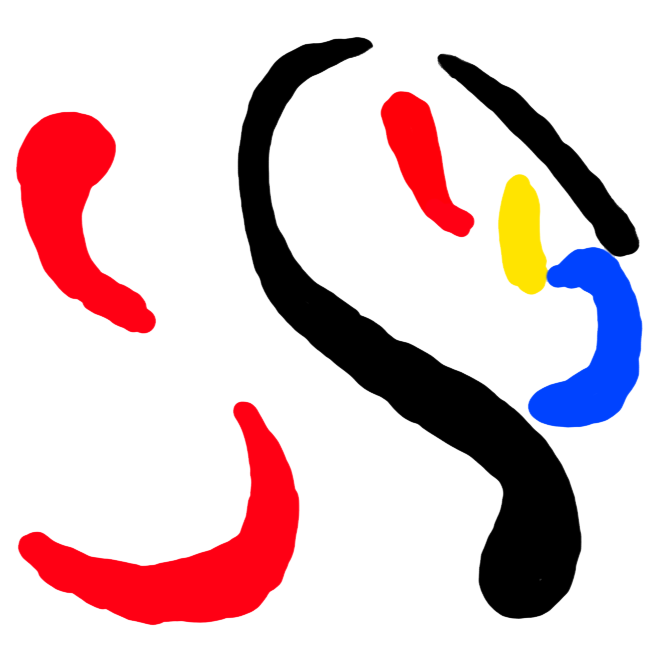P1082 同余方程
就是一个裸的 exgcd,没了。
顺便也当板子存起来(
#include <bits/stdc++.h>
#define ll long long
#define ls id << 1
#define rs id << 1 | 1
#define mem(array, value, size, type) memset(array, value, ((size) + 5) * sizeof(type))
#define memarray(array, value) memset(array, value, sizeof(array))
#define fillarray(array, value, begin, end) fill((array) + (begin), (array) + (end) + 1, value)
#define fillvector(v, value) fill((v).begin(), (v).end(), value)
#define pb(x) push_back(x)
#define st(x) (1LL << (x))
#define pii pair<int, int>
#define mp(a, b) make_pair((a), (b))
#define Flush fflush(stdout)
#define vecfirst (*vec.begin())
#define veclast (*vec.rbegin())
#define vecall(v) (v).begin(), (v).end()
#define vecupsort(v) (sort((v).begin(), (v).end()))
#define vecdownsort(v, type) (sort(vecall(v), greater<type>()))
#define veccmpsort(v, cmp) (sort(vecall(v), cmp))
using namespace std;
const int N = 500050;
const int inf = 0x3f3f3f3f;
const ll llinf = 0x3f3f3f3f3f3f3f3f;
const int mod = 998244353;
const int MOD = 1e9 + 7;
const double PI = acos(-1.0);
clock_t TIME__START, TIME__END;
void program_end()
{
#ifdef ONLINE
printf("\n\nTime used: %.6lf(s)\n", ((double)TIME__END - TIME__START) / 1000);
system("pause");
#endif
}
ll a, b, x, y;
void exgcd(ll a, ll b, ll &x, ll &y)
{
if (!b)
{
x = 1, y = 0;
return;
}
exgcd(b, a % b, x, y);
ll t = x;
x = y;
y = t - a / b * y;
}
inline void solve()
{
cin >> a >> b;
exgcd(a, b, x, y);
x = ((x % b) + b) % b;
cout << x << endl;
}
int main()
{
TIME__START = clock();
int Test = 1;
// scanf("%d", &Test);
while (Test--)
solve();
TIME__END = clock();
program_end();
return 0;
}
P2613 【模板】有理数取余
你看题目中就有一个【模板】这两个字,那就肯定是个模板了......
嘛,也当成板子存下来吧(
#include <bits/stdc++.h>
#define ll long long
#define ls id << 1
#define rs id << 1 | 1
#define mem(array, value, size, type) memset(array, value, ((size) + 5) * sizeof(type))
#define memarray(array, value) memset(array, value, sizeof(array))
#define fillarray(array, value, begin, end) fill((array) + (begin), (array) + (end) + 1, value)
#define fillvector(v, value) fill((v).begin(), (v).end(), value)
#define pb(x) push_back(x)
#define st(x) (1LL << (x))
#define pii pair<int, int>
#define mp(a, b) make_pair((a), (b))
#define Flush fflush(stdout)
#define vecfirst (*vec.begin())
#define veclast (*vec.rbegin())
#define vecall(v) (v).begin(), (v).end()
#define vecupsort(v) (sort((v).begin(), (v).end()))
#define vecdownsort(v, type) (sort(vecall(v), greater<type>()))
#define veccmpsort(v, cmp) (sort(vecall(v), cmp))
using namespace std;
const int N = 500050;
const int inf = 0x3f3f3f3f;
const ll llinf = 0x3f3f3f3f3f3f3f3f;
const int mod = 998244353;
const int MOD = 1e9 + 7;
const double PI = acos(-1.0);
clock_t TIME__START, TIME__END;
void program_end()
{
#ifdef ONLINE
printf("\n\nTime used: %.6lf(s)\n", ((double)TIME__END - TIME__START) / 1000);
system("pause");
#endif
}
template <class T>
inline void read(T &x)
{
bool f = 0;
char ch = getchar();
while (ch < '0' || ch > '9')
{
if (ch == '-')
f = 1;
ch = getchar();
}
while (ch >= '0' && ch <= '9')
{
x = x * 10 + ch - '0';
x %= 19260817ll;
ch = getchar();
}
if (f)
x = -x;
}
ll a, b, x, y;
void exgcd(ll a, ll b, ll &x, ll &y)
{
if (b == 0)
{
x = 1, y = 0;
return;
}
exgcd(b, a % b, x, y);
ll t = x;
x = y;
y = t - a / b * y;
}
inline ll getinv(ll a, ll mod2)
{
ll x = 0, y = 0;
exgcd(a, mod2, x, y);
x = (x % mod2 + mod2) % mod2;
return x;
}
inline void solve()
{
read(a), read(b);
if (__gcd(b, 19260817ll) > 1)
return puts("Angry!"), void();
ll invb = getinv(b, 19260817ll);
cout << a * invb % 19260817ll << endl;
}
int main()
{
TIME__START = clock();
int Test = 1;
// scanf("%d", &Test);
while (Test--)
solve();
TIME__END = clock();
program_end();
return 0;
}
P2158 [SDOI2008]仪仗队
这题也是非常经典的了
如果设原点是 $(0,0)$,那么只有 $\gcd(i,j)==1$ 的那些人才会被看到,因为之后的人就被他挡住了。
于是答案就是
$$
\begin{eqnarray}
& 1+2\sum\limits_{i=1}^{n-1}\sum\limits_{j=1}^{i}[\gcd(i,j)==1] \\
& = 1+2\sum\limits_{i=1}^{n-1}\varphi(i)
\end{eqnarray}
$$
然后这个就是 $\mathcal{O}(n)$ 的。当然要搞事的话后面那个也可以用杜教筛去做(比如我)。
#include <iostream>
#include <cstdio>
#include <cstring>
#include <cmath>
#include <vector>
#include <map>
#include <cstdlib>
#include <ctime>
#include <string>
#include <queue>
#define ll long long
#define ls id << 1
#define rs id << 1 | 1
#define mem(array, value, size, type) memset(array, value, ((size) + 5) * sizeof(type))
#define memarray(array, value) memset(array, value, sizeof(array))
#define fillarray(array, value, begin, end) fill((array) + (begin), (array) + (end) + 1, value)
#define fillvector(v, value) fill((v).begin(), (v).end(), value)
#define pb(x) push_back(x)
#define st(x) (1LL << (x))
#define pii pair<int, int>
#define mp(a, b) make_pair((a), (b))
#define Flush fflush(stdout)
#define vecfirst (*vec.begin())
#define veclast (*vec.rbegin())
#define vecall(v) (v).begin(), (v).end()
#define vecupsort(v) (sort((v).begin(), (v).end()))
#define vecdownsort(v, type) (sort(vecall(v), greater<type>()))
#define veccmpsort(v, cmp) (sort(vecall(v), cmp))
using namespace std;
const int N = 250;
const int inf = 0x3f3f3f3f;
const ll llinf = 0x3f3f3f3f3f3f3f3f;
const int mod = 998244353;
const int MOD = 1e9 + 7;
const double PI = acos(-1.0);
clock_t TIME__START, TIME__END;
void program_end()
{
#ifdef ONLINE
printf("\nTime used: %.6lf(s)\n", ((double)TIME__END - TIME__START) / 1000);
system("pause");
#endif
}
bool vis[N];
ll tot, pri[N], mu[N], sum_mu[N], sum_phi[N], phi[N];
map<ll, ll> visphi, vismu;
inline void shaipri(int lim)
{
phi[1] = mu[1] = 1;
for (int i = 2; i < lim; ++i)
{
if (!vis[i])
vis[i] = 1, pri[++tot] = i, mu[i] = -1, phi[i] = i - 1;
for (int j = 1; j <= tot && i * pri[j] < lim; ++j)
{
vis[i * pri[j]] = 1;
if (i % pri[j])
{
mu[i * pri[j]] = -mu[i];
phi[i * pri[j]] = phi[i] * (pri[j] - 1);
}
else
{
phi[i * pri[j]] = phi[i] * pri[j];
mu[i * pri[j]] = 0;
break;
}
}
}
}
int n;
ll solvemu(ll x)
{
if (vismu[x])
return vismu[x];
if (x < N)
return sum_mu[x];
ll ret = 1;
for (int l = 2, r; l <= x; l = r + 1)
{
r = x / (x / l);
ret -= (r - l + 1ll) * solvemu(x / l);
}
return vismu[x] = ret;
}
ll solvephi(ll x)
{
if (visphi[x])
return visphi[x];
if (x < N)
return sum_phi[x];
ll ret = x * (x + 1) / 2;
for (int l = 2, r; l <= x; l = r + 1)
{
r = x / (x / l);
ret -= (r - l + 1ll) * solvephi(x / l);
}
return visphi[x] = ret;
}
inline void solve()
{
scanf("%d", &n);n--;
if (n==0)return puts("0"),void();
// ll ansmu = solvemu(n);
ll ansphi = solvephi(n);
printf("%lld\n",1+ 2*ansphi);
}
int main()
{
TIME__START = clock();
shaipri(N);
for (int i = 1; i < N; ++i)
sum_mu[i] = sum_mu[i - 1] + mu[i], sum_phi[i] = sum_phi[i - 1] + phi[i];
int Test = 1;
// scanf("%d", &Test);
while (Test--)
solve();
TIME__END = clock();
program_end();
return 0;
}
未完待续






Comments NOTHING